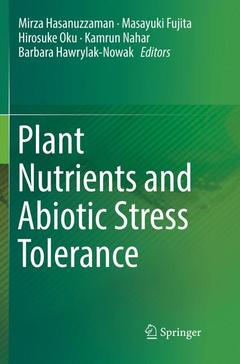Plant Nutrients and Abiotic Stress Tolerance, Softcover reprint of the original 1st ed. 2018
Coordonnateurs : Hasanuzzaman Mirza, Fujita Masayuki, Oku Hirosuke, Nahar Kamrun, Hawrylak-Nowak Barbara

This book discusses many aspects of plant-nutrient-induced abiotic stress tolerance. It consists of 22 informative chapters on the basic role of plant nutrients and the latest research advances in the field of plant nutrients in abiotic stress tolerance as well as their practical applications.
Today, plant nutrients are not only considered as food for plants, but also as regulators of numerous physiological processes including stress tolerance. They also interact with a number of biological molecules and signaling cascades. Although research work and review articles on the role of plant nutrients in abiotic stress tolerance have been published in a range of journals, annual reviews and book chapters, to date there has been no comprehensive book on this topic.
As such, this timely book is a valuable resource for a wide audience, including plant scientists, agronomists, soil scientists, botanists, molecular biologists and environmental scientists.
Prof. Hasanuzzaman published over 100 articles in peer-reviewed journals and books. He has edited 2 books and written 35 book chapters on important aspects of plant physiology, plant stress responses, and environmental problems in relation to plant species. These books were published by the internationally renowned publishers (Springer, Elsevier, CRC Press, Wiley, etc.). His publications got over 2000 citations with h-index: 23 (according to Scopus). Prof. Mirza Hasanuzzaman is a research supervisor of undergraduate and graduate students and supervised 20 M.S. students so far. He is Editor and Reviewer of more than 50 peer reviewed international journals and recipient of ‘Publons Peer Review Award 2017’.
Date de parution : 12-2018
Ouvrage de 590 p.
15.5x23.5 cm
Date de parution : 06-2018
Ouvrage de 590 p.
15.5x23.5 cm



